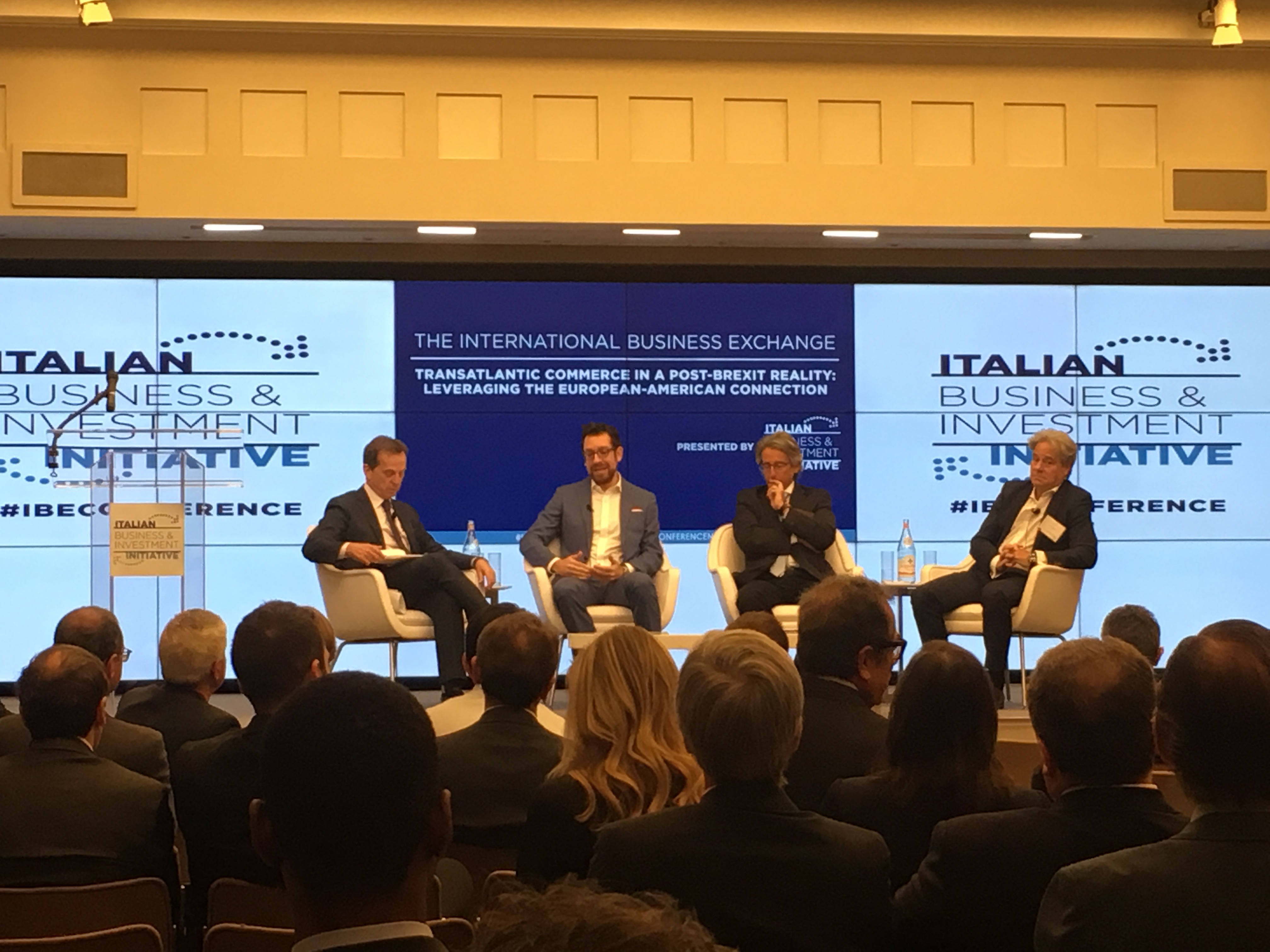On April 17 the Italian Business and Investment Initiative (IB&II) hosted their ninth annual International Business Exchange at the Harold Pratt House in New York City. The theme of the conference was Transatlantic Commerce in a Post-Brexit Reality: Leveraging the European-American Connection, and featured panelists including distinguished professors, CEOs, and analysts. Founder, President, and CEO of IB&II, Fernando Napolitano, participated in one of five panels in addition to giving opening remarks alongside Francesco Genuardi, Italian Consul General of New York, and Richard N. Haas, President of the Council on Foreign Relations.
According to IB&II’s website, it is an organization that strives to foster the dialogue between European and American industry experts and government and academic institutions, which in turn promotes the investment opportunities available in Italy. The goal of the International Business Exchange is to examine the current challenges and questions that face societies in the U.S. and Europe.
Though there were CEOs, founders, and executives present at the conference, government, nonprofits, and academia were also represented by their own leaders, both American and European. The panel discussion topics included trade wars, private sector responsibility regarding ongoing societal challenges, and how the private and public sectors can work together to prepare future employers and employees. Considering fairly recent major global events with impending international socio-economic impacts, such as Brexit or the ever-increasing threat posed by climate change, it’s a good time to hold an event replete with individuals who have the credentials and the experience to scrutinize the facts and attempt to offer solutions for certain problems at hand.
I arrived just in time for the second panel, “Business in the New Societal Context: The Role of the Private Sector in a New European Political and Socioeconomic Reality,” moderated by Jere Sullivan, Vice Chairman of International Public Affairs at Edelman. The three speakers were Gideon Maltz, Executive Director for the Tent Partnership for Refugees; Jeffrey Hedberg, CEO of Wind Tre; and Dr. Manlio Coviello, President of the Board at Terna Plus.

I’m skeptical when it comes to the positive influence big business can have in society because of its proclivity to value profits and shareholders over practices like sustainability. This, of course, is mostly by necessity, since business depends on money and beating competitors. It seems to me that the private sector is too much of a cut-throat world to be first and foremost socially responsible, but I was interested in hearing how much accountability these executives would have their companies own.
I wasn’t thrilled to hear Mr. Sullivan say “that more and more people are really looking to the companies they work for to help them, not only in terms of their livelihoods, but in making change in the communities in which they operate.” But maybe because I hear ‘business’ and think of Walmart asking for Thanksgiving food donations from customers for their own employees because they weren’t paying their workers well enough to be able to afford holiday dinner without extra help. Are people really trusting employers with quality of life standards?
However, in exploring this topic further, Mr. Maltz explained that businesses have the opportunity to positively impact society. In the example he gave on behalf of the Tent Partnership, this impact involves businesses acting as a “bridge” between the communities in which they operate and refugees by incorporating them into the workforce fabric. The refugee crisis has been a particularly touchy subject in European politics, and has fueled a significant rise of right-wing populist groups (not unlike the anti-immigration undercurrents in the American political arena). And Mr. Maltz made the argument that it is only “natural” for businesses to be integration mechanisms: they have platforms to promote social responsibility. They can, for instance, update their business models to include goods and services for refugees—or simply hire them. A company that is committed to helping refugees assimilate into life in their new communities and that has partnered with other big names in Italy and the U.S., such as Generali and Google, sways me to believe that it is actually possible for some businesses to be ethical.
I’m not, however, convinced that “collective responsibility” between individuals, governments, and businesses with respect to the sustainability of the commons and the environment particularly makes sense. Big oil, big sugar, and big tobacco are all politically involved in the United States’ government and have influenced legislation that even affects things like what children eat at school. I think businesses still hold a greater share of responsibility of what happens to the commons than the government (which is at times blocked from regulating business effectively) and the consumers. Individual responsibility for climate change isn’t really valid when about 70% of the greenhouse gas emissions produced by society comes from just 100 companies, according to a report by CDP). However, there is a definitive shift in what is considered tolerable behavior by companies, this is made clear by the mere existence of an entity like the Tent Partnership for Refugees. With any luck, this trend toward socially-responsible business will only grow in the next few years and my skepticism will be proven unfounded soon.











